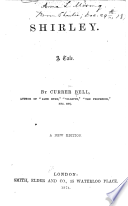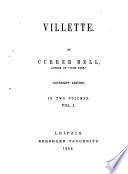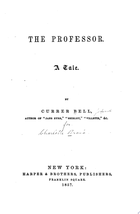Works

Shirley
Charlotte BrontëFamous Charlotte Brontë Quotes
“I avoid looking forward or backward, and try to keep looking upward.”
15 January, 1849. As quoted in Elizabeth Gaskell The life of Charlotte Brontë (1870), p. 285
I have as much soul as you — and full as much heart! And if God had gifted me with some beauty and much wealth, I should have made it as hard for you to leave me, as it is now for me to leave you. I am not talking to you now through the medium of custom, conventionalities, nor even of mortal flesh: it is my spirit that addresses your spirit; just as if both had passed through the grave, and we stood at God's feet, equal — as we are!
Jane to Mr. Rochester (Ch. 23)
Jane Eyre (1847)
Jane to Mr. Rochester (Ch. 23)
Jane Eyre (1847)
Context: Do you think I am an automaton? — a machine without feelings? and can bear to have my morsel of bread snatched from my lips, and my drop of living water dashed from my cup? Do you think, because I am poor, obscure, plain, and little, I am soulless and heartless? You think wrong! — I have as much soul as you — and full as much heart! And if God had gifted me with some beauty and much wealth, I should have made it as hard for you to leave me, as it is now for me to leave you. I am not talking to you now through the medium of custom, conventionalities, nor even of mortal flesh: it is my spirit that addresses your spirit; just as if both had passed through the grave, and we stood at God's feet, equal — as we are!
Helen Burns to Jane (Ch. 9)
Jane Eyre (1847)
Charlotte Brontë Quotes about God
Charlotte Brontë, on Letters on the Nature and Development of Man (1851), by Harriet Martineau. Letter to James Taylor (11 February 1851) The life of Charlotte Brontë
Poems by Currer, Ellis, and Acton Bell (1846), Pilate's Wife's Dream (1846)
“Men judge us by the success of our efforts. God looks at the efforts themselves.”
This quote is sometimes pointing Brontë as the author, but is is originally attributed to Richard Whately, first quoted in The Railroad Telegrapher, Volume 18 (1901), Order of Railroad Telegraphers, page 713.
Disputed
Source: The Professor (1857), Ch. XVI
(Referring to marriage). As quoted in Moglen, Helen (1984) Charlotte Brontë: the self conceived, University of Wisconsin Press, p. 235
Charlotte Brontë Quotes about feelings
Jane (Ch. 11)
Jane Eyre (1847)
Charlotte Brontë, on Modern Painters, Vol. 1 (1843), by John Ruskin. Letter to W. S. Williams (31 July 1848) The Letters of Charlotte Brontë
Mr. Rochester and Jane (Ch. 23)
Jane Eyre (1847)
Letter to G. H. Lewes, 6 November 1847
Context: You advise me, too, not to stray far from the ground of experience, as I become weak when I enter the region of fiction; and you say, "real experience is perennially interesting, and to all men."I feel that this also is true; but, dear Sir, is not the real experience of each individual very limited? And, if a writer dwells upon that solely or principally, is he not in danger of repeating himself, and also of becoming an egotist? Then, too, imagination is a strong, restless faculty, which claims to be heard and exercised: are we to be quite deaf to her cry, and insensate to her struggles? When she shows us bright pictures, are we never to look at them, and try to reproduce them? And when she is eloquent, and speaks rapidly and urgently in our ear, are we not to write to her dictation?
Charlotte Brontë: Trending quotes
“It is not violence that best overcomes hate — nor vengeance that most certainly heals injury.”
Helen Burns to Jane (Ch. 6)
Jane Eyre (1847)
Context: It is not violence that best overcomes hate — nor vengeance that most certainly heals injury. … Read the New Testament, and observe what Christ says, and how he acts — make his word your rule, and his conduct your example. … Love your enemies; bless them that curse you; do good to them that hate you and despitefully use you.
Jane (Ch. 17)
Jane Eyre (1847)
Context: Most true is it that "beauty is in the eye of the gazer." My master’s colourless, olive face, square, massive brow, broad and jetty eyebrows, deep eyes, strong features, firm, grim mouth, — all energy, decision, will, — were not beautiful, according to rule; but they were more than beautiful to me; they were full of an interest, an influence that quite mastered me, — that took my feelings from my own power and fettered them in his. I had not intended to love him; the reader knows I had wrought hard to extirpate from my soul the germs of love there detected; and now, at the first renewed view of him, they spontaneously arrived, green and strong! He made me love him without looking at me.
“Liberty lends us her wings and Hope guides us by her star.”
Source: Villette (1853), Ch. VI: London
Charlotte Brontë Quotes
Jane (Ch. 12)
Jane Eyre (1847)
Context: It is in vain to say human beings ought to be satisfied with tranquility: they must have action; and they will make it if they cannot find it. Millions are condemned to a stiller doom than mine, and millions are in silent revolt against their lot. Nobody knows how many rebellions besides political rebellions ferment in the masses of life which people earth. Women are supposed to be very calm generally: but women feel just as men feel; they need exercise for their faculties, and a field for their efforts as much as their brothers do; they suffer from too rigid a restraint, too absolute a stagnation, precisely as men would suffer; and it is narrow-minded in their more privileged fellow-creatures to say that they ought to confine themselves to making puddings and knitting stockings, to playing on the piano and embroidering bags. It is thoughtless to condemn them, or laugh at them, if they seek to do more or learn more than custom has pronounced necessary for their sex.
Jane (Ch. 10)
Jane Eyre (1847)
Context: School-rules, school-duties, school-habits and notions, and voices, and faces, and phrases, and costumes, and preferences, and antipathies — such was what I knew of existence. And now I felt that it was not enough; I tired of the routine of eight years in one afternoon. I desired liberty; for liberty I gasped; for liberty I uttered a prayer; it seemed scattered on the wind then faintly blowing. I abandoned it and framed a humbler supplication; for change, stimulus: that petition, too, seemed swept off into vague space: "Then," I cried, half desperate, "grant me at least a new servitude!"Here a bell, ringing the hour of supper, called me downstairs.
Preface, 2nd edition (21 December 1847)
Jane Eyre (1847)
Context: p>Conventionality is not morality. Self-righteousness is not religion. To attack the first is not to assail the last. To pluck the mask from the face of the Pharisee, is not to lift an impious hand to the Crown of Thorns. These things and deeds are diametrically opposed: they are as distinct as is vice from virtue. Men too often confound them: they should not be confounded: appearance should not be mistaken for truth; narrow human doctrines, that only tend to elate and magnify a few, should not be substituted for the world-redeeming creed of Christ. There is — I repeat it — a difference; and it is a good, and not a bad action to mark broadly and clearly the line of separation between them.The world may not like to see these ideas dissevered, for it has been accustomed to blend them; finding it convenient to make external show pass for sterling worth — to let white-washed walls vouch for clean shrines. It may hate him who dares to scrutinise and expose — to rase the gilding, and show base metal under it — to penetrate the sepulchre, and reveal charnel relics: but hate as it will, it is indebted to him.</p
Preface, 2nd edition (21 December 1847)
Jane Eyre (1847)
Context: p>Conventionality is not morality. Self-righteousness is not religion. To attack the first is not to assail the last. To pluck the mask from the face of the Pharisee, is not to lift an impious hand to the Crown of Thorns. These things and deeds are diametrically opposed: they are as distinct as is vice from virtue. Men too often confound them: they should not be confounded: appearance should not be mistaken for truth; narrow human doctrines, that only tend to elate and magnify a few, should not be substituted for the world-redeeming creed of Christ. There is — I repeat it — a difference; and it is a good, and not a bad action to mark broadly and clearly the line of separation between them.The world may not like to see these ideas dissevered, for it has been accustomed to blend them; finding it convenient to make external show pass for sterling worth — to let white-washed walls vouch for clean shrines. It may hate him who dares to scrutinise and expose — to rase the gilding, and show base metal under it — to penetrate the sepulchre, and reveal charnel relics: but hate as it will, it is indebted to him.</p
Jane to Helen Burns (Ch. 6)
Jane Eyre (1847)
Context: If people were always kind and obedient to those who are cruel and unjust; the wicked people would have it all their own way: they would never feel afraid, and so they would never alter, but would grow worse and worse. When we are struck at without a reason, we should strike back again very hard; I am sure we should — so hard as to teach the person who struck us never to do it again.
Source: Shirley (1849), Ch. 1: Levitical
Jane to Mrs. Reed (Ch. 4)
Jane Eyre (1847)
Source: Villette (1853), Chapter XXXVI: The Apple of Discord
Jane to Rochester (Ch. 14)
Jane Eyre (1847)
Source: Shirley (1849), Ch. 5: Hollow's Cottage
Helen Burns to Jane (Ch. 8)
Jane Eyre (1847)
Helen Burns to Jane (Ch. 6)
Jane Eyre (1847)
Jane to Mr. Rochester (Ch. 14)
Jane Eyre (1847)
Source: Shirley (1849), Ch. 20: To-Morrow
Poems by Currer, Ellis, and Acton Bell (1846), The Wood (1846)
Source: Villette (1853), Ch. XXII: The Letter
Mr. Rochester to Jane (Ch. 14)
Jane Eyre (1847)
Charlotte Brontë, on William Macready. Charlotte Brontë and Her Circle, (by Clement King Shorter) (1896)
Helen Burns to Jane (Ch. 6)
Jane Eyre (1847)
Source: Villette (1853), Chapter XXXVII: Sunshine
“What have I to do with millions [of people]? The eighty I know despise me.”
Jane to Helen Burns (Ch. 8)
Jane Eyre (1847)
Jane (Ch. 11)
Jane Eyre (1847)
Jane (Ch. 12)
Jane Eyre (1847)
Source: The Professor (1857), Ch. XX
Jane (Ch. 27)
Jane Eyre (1847)
“What animal magnetism drew thee and me together—I know not.”
Source: The Professor (1857), Ch. I
Source: The Professor (1857), Ch. XXV
Source: Shirley (1849), Ch. 22: Two Lives
Charlotte Brontë, on William Makepeace Thackeray. Charlotte Brontë and Her Circle, (by Clement King Shorter) (1896)
Jane (Ch. 36)
Jane Eyre (1847)
“I have not much pride under such circumstances: I would always rather be happy than dignified.”
Source: Jane Eyre (1847), Ch. 34
Jane to Mr. Rochester (Ch. 23)
Jane Eyre (1847)
Jane to St. John Rivers (Ch. 34)
Jane Eyre (1847)
“I can but die… and I believe in God. Let me try and wait His will in silence.”
Jane (Ch. 28)
Jane Eyre (1847)
Carolyn Warner (1992), page 135
Bessie's song (Ch. 3)
Jane Eyre (1847)
“My bride is here… because my equal is here, and my likeness.”
Mr. Rochester to Jane (Ch. 23)
Jane Eyre (1847)
Charlotte Brontë, on attending The Great Exhibition of 1851. The Brontes' Life and Letters, (by Clement King Shorter) (1907)
Jane (Ch. 12)
Jane Eyre (1847)
Jane (Ch. 27)
Jane Eyre (1847)
Letter to Emily Brontë, (1 December 1843) The life of Charlotte Brontë (1857) by Elizabeth Gaskell.
Source: Villette (1853), Chapter XXXI: The Dryad
“I can be on guard against my enemies, but God deliver me from my friends!”
In response to George Henry Lewes (LL, II, v, 272); Miriam Farris Allott (1974), The Brontës, the critical heritage, page 160;
Letter to Ellen Nussey, 4 July 1834.
The letters of Charlotte Brontë (edited by Margaret Smith), Vol. I: 1829–1847, p. 130
Source: The Professor (1857), Ch. XXIV
Source: Villette (1853), Ch. XXII: The Letter
Jane (Ch. 9)
Jane Eyre (1847)
Source: Villette (1853), Ch. XXIX: Monsieur's Fête



